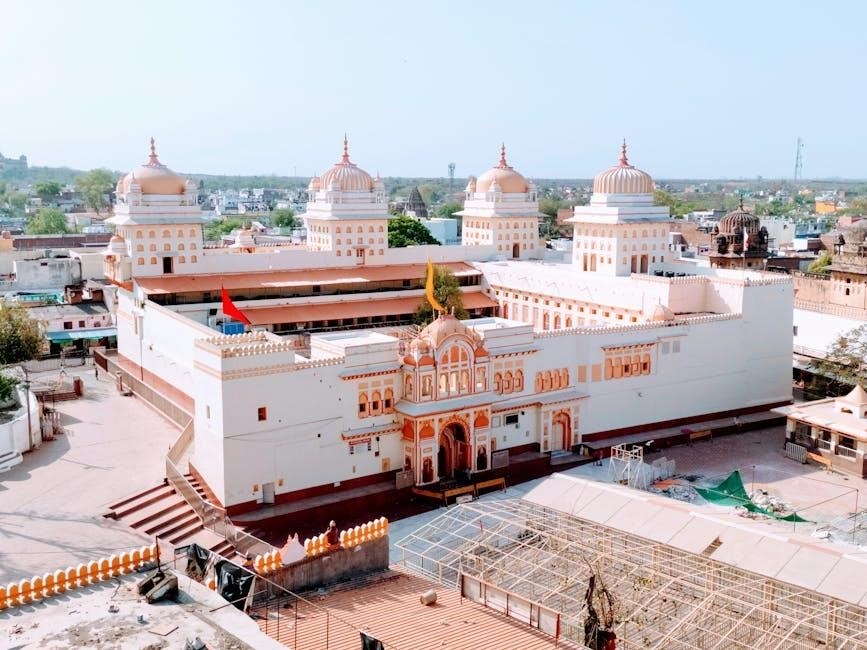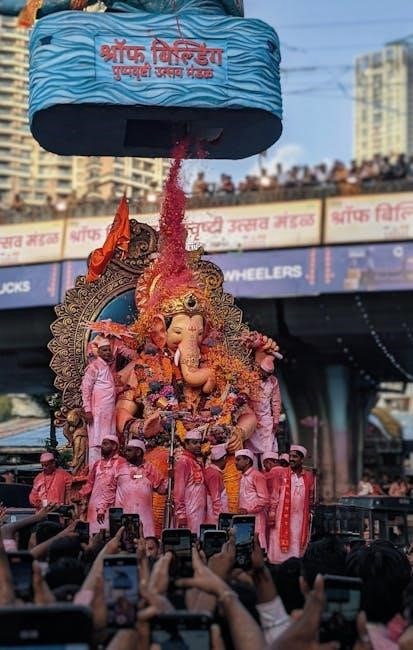
Raja Shyamala Ashtothram is a sacred Telugu hymn with 1000 names, offering divine grace. Available as a Telugu PDF, it enriches spiritual practices and cultural devotion.
Overview of the Hymn
Raja Shyamala Ashtothram is a revered devotional hymn composed in Telugu, comprising 1000 names (Ashtottara Shatanama Stotram) and 108 names (Ashtottara Shatanamavali) of Goddess Shyamala. The hymn is structured with lyrical verses, each extolling the divine attributes and grace of the deity. It is widely used in worship and chanting, offering spiritual solace and connection with the divine. The Telugu PDF version is easily accessible, enabling devotees to recite and seek blessings. This sacred text is a cornerstone of Telugu devotional literature, reflecting deep cultural and religious heritage.
Significance in Telugu Devotional Literature
Raja Shyamala Ashtothram holds a revered place in Telugu devotional literature, celebrated for its profound spiritual and cultural significance. This hymn, with its intricate composition, is a testament to the rich literary heritage of Telugu devotion. It is widely cherished for its ability to connect devotees with the divine essence of Goddess Shyamala, embodying her grace and virtues. The hymn’s structure and lyrical depth make it a cornerstone of worship, fostering spiritual growth and emotional solace. Its availability in Telugu PDF ensures accessibility, preserving its tradition and enabling widespread recitation in both personal and communal practices.

Goddess Shyamala Devi
Goddess Shyamala Devi is a revered deity, often depicted as a form of the divine mother, embodying grace and wisdom. Her significance in Hindu spirituality is profound, and devotees seek her blessings through hymns like the Raja Shyamala Ashtothram.
Who is Goddess Shyamala?
Goddess Shyamala is a revered incarnation of the divine mother, often associated with Goddess Matangi. She is depicted as a greenish-hued deity, symbolizing growth and harmony, often holding a veena, parrot, and sugarcane. Worshiped for her grace and wisdom, Shyamala Devi is believed to embody the essence of creativity and prosperity. Her name, meaning “dark-haired beauty,” reflects her nurturing and protective nature. In Hindu mythology, she is celebrated for granting spiritual and material blessings, making her a central figure in devotional practices, particularly through hymns like the Raja Shyamala Ashtothram.
Her Role in Hindu Mythology
Goddess Shyamala, often revered as Raja Shyamala or Matangi, holds a significant place in Hindu mythology as a symbol of wisdom, creativity, and sovereignty. She is believed to bestow ruling power and prosperity upon her devotees. Depicted with a veena, parrot, and sugarcane, Shyamala embodies artistic expression and fertility. Her role as a protector and guide is deeply rooted in Hindu scriptures, where she is often invoked for spiritual growth and material success. The Raja Shyamala Ashtothram is a powerful medium to connect with her divine energy, seeking her blessings for a fulfilling life.

Structure of Raja Shyamala Ashtothram
Raja Shyamala Ashtothram consists of the 1000 Names (Ashtottara Shatanama Stotram) and the 108 Names (Ashtottara Shatanamavali), both composed as hymns to invoke Goddess Shyamala’s grace.
The 1000 Names (Ashtottara Shatanama Stotram)
The 1000 Names (Ashtottara Shatanama Stotram) is a comprehensive invocation of Goddess Shyamala, detailing her divine attributes and blessings. This sacred hymn is revered for its depth and spiritual significance, offering devotees a profound way to connect with the deity. Each name embodies a unique facet of her grace, making it a powerful tool for spiritual growth and worship. The Telugu PDF version of this stotram is widely available, allowing devotees to recite and reflect on her divine qualities effortlessly. It is particularly cherished for its ability to confer spiritual enlightenment and inner peace to those who chant it sincerely.
The 108 Names (Ashtottara Shatanamavali)

The 108 Names (Ashtottara Shatanamavali) is a concise yet potent version of the hymn, focusing on the essential attributes of Goddess Shyamala. This sacred text is deeply revered for its ability to invoke divine grace and protection. The Telugu PDF format allows devotees to easily access and recite these 108 names, which are believed to encapsulate the deity’s full essence. Chanting this stotram is considered a powerful practice for spiritual growth, offering blessings and strengthening one’s connection with Goddess Shyamala. Its structure and brevity make it ideal for daily worship and meditation.
Benefits of Chanting the Ashtothram
Chanting the Raja Shyamala Ashtothram offers spiritual growth, peace, and prosperity. It helps devotees overcome obstacles and achieve fulfillment through divine grace.
Spiritual and Mystical Benefits
Chanting the Raja Shyamala Ashtothram brings profound spiritual and mystical benefits. It enhances inner peace, strengthens divine connection, and fosters meditation. Devotees experience Goddess Shyamala’s grace, gaining wisdom, positivity, and protection from negative energies. Regular recitation is believed to harmonize life, bestow blessings, and grant spiritual liberation. The hymn’s sacred vibrations uplift the soul, aligning it with universal consciousness and promoting self-realization. Many followers attest to its transformative power, making it a cherished practice in spiritual journeys.
Practical Benefits in Daily Life
Chanting the Raja Shyamala Ashtothram offers numerous practical benefits in daily life. It is believed to help devotees find lost items, manage anger, and attract positive energy. Regular recitation fosters mental clarity, improving decision-making and problem-solving skills. The hymn is also said to bring good fortune, prosperity, and harmony in personal and professional relationships. By invoking Goddess Shyamala’s blessings, individuals can overcome obstacles and achieve their goals. Many followers report enhanced calmness and resilience, making it easier to navigate life’s challenges effectively.
Downloading the Telugu PDF
The Raja Shyamala Ashtothram in Telugu PDF can be easily downloaded from websites like stotranidhi.com, offering free access for devotees to recite and worship seamlessly.
Popular Websites for Download
Devotees can conveniently download the Raja Shyamala Ashtothram in Telugu PDF from reputable websites like stotranidhi.com and ssbhakthi.com. These platforms offer free access to the sacred text, ensuring easy download and storage on personal devices. Additionally, other spiritual websites like celextel.com and stotraratna.com provide user-friendly options for downloading the PDF. These resources are ideal for those seeking to deepen their spiritual practice and connect with Goddess Shyamala Devi through her divine names.
Steps to Download and Save
To download the Raja Shyamala Ashtothram in Telugu PDF, visit websites like stotranidhi.com or ssbhakthi.com. Navigate to the search bar, type “Raja Shyamala Ashtothram,” and select the appropriate result. Click the download button, choose a location on your device, and save the file. Once downloaded, you can open and read the PDF using any PDF reader. Ensure a stable internet connection for a smooth download process. Save the file for future reference and easy access during worship or recitation.
Using the PDF for Worship

The Raja Shyamala Ashtothram PDF is ideal for recitation during worship. Open the file, read the hymn with devotion, and seek Goddess Shyamala Devi’s blessings.
How to Recite the Ashtothram

To recite the Raja Shyamala Ashtothram, begin by cleansing your space and sitting comfortably. Open the Telugu PDF and start with a prayer to Goddess Shyamala Devi. Recite each name clearly, maintaining concentration. Pause briefly after each verse for reflection. Use a rudraksha mala to count repetitions if needed. Conclude with a heartfelt thanksgiving prayer. Regular recitation enhances devotion and invokes divine grace, fostering spiritual growth and peace.
Best Practices for Effective Chanting
For effective chanting of Raja Shyamala Ashtothram, ensure a clean and serene environment. Dress modestly and sit in a comfortable posture. Use a rudraksha mala to count repetitions, if needed. Begin with a prayer to Goddess Shyamala Devi, seeking her blessings. Maintain focus and clarity in pronunciation, especially while reciting the Telugu PDF version. Chant during early morning or evening for optimal spiritual resonance. Avoid distractions and cultivate a calm mind. Regular practice enhances devotion and connection with the divine energy of Shyamala Devi.

Cultural and Religious Significance
Raja Shyamala Ashtothram holds deep cultural and religious significance, reflecting Telugu heritage and devotion to Goddess Shyamala. It embodies spiritual traditions and enriches worship practices in Hindu communities.
Role in Telugu Culture
Raja Shyamala Ashtothram plays a pivotal role in Telugu culture, reflecting deep spiritual and devotional traditions. It is often recited during festivals and rituals, fostering a sense of community and shared heritage. The hymn, with its rich lyrical content, is a cherished part of Telugu devotional practices, inspiring mindfulness and reverence for Goddess Shyamala. Its widespread acceptance and cultural significance make it a cornerstone of Telugu identity, preserving spiritual values and enriching cultural life for generations.
Importance in Hindu Religious Practices
Raja Shyamala Ashtothram holds profound significance in Hindu religious practices, especially in devotion to Goddess Shyamala, a form of divine femininity. It is widely used in daily worship, rituals, and festivals to invoke her blessings for wisdom, creativity, and prosperity. Chanting the hymn is believed to bring spiritual peace, resolve life’s challenges, and foster a deeper connection with the divine. Its recitation is considered a powerful practice to attain grace, prosperity, and inner harmony, making it an integral part of Hindu devotional traditions and spiritual growth.
Raja Shyamala Ashtothram is a sacred devotional treasure, offering 1000 names of Goddess Shyamala. Its Telugu PDF form makes it accessible for seekers of divine blessings and spiritual growth, fostering a meaningful journey toward peace and prosperity.
Final Thoughts
Raja Shyamala Ashtothram is a profound devotional text, offering 1000 and 108 names of Goddess Shyamala. Its availability in Telugu PDF ensures accessibility for devotees seeking spiritual growth and divine grace.
Chanting this hymn fosters inner peace, prosperity, and connection with the divine. Downloading the Telugu PDF from trusted websites allows devotees to recite it with ease, enriching their worship and daily life with its sacred vibrations.
Encouragement to Engage with the Ashtothram
Engaging with the Raja Shyamala Ashtothram is a transformative experience, offering deep spiritual growth and divine grace. Its availability in Telugu PDF makes it easily accessible for devotees worldwide. By chanting these sacred names, one can connect with Goddess Shyamala’s blessings, fostering inner peace, prosperity, and emotional well-being. This ancient hymn is not just a devotional practice but also a cultural treasure, preserving Telugu heritage. Embrace this sacred text and let its vibrations guide you toward a more enlightened and fulfilling life.
- Download the Telugu PDF and experience its divine power.
- Recite it regularly to seek Goddess Shyamala’s grace.
- Share its significance with others to spread its spiritual benefits.
Let the Raja Shyamala Ashtothram be your pathway to spiritual enlightenment and divine connection.